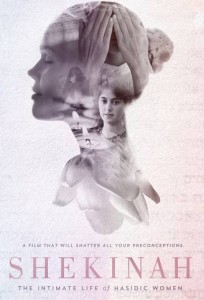by eva attali katz for FILMbutton
Director Abbey Jack Neidik draws his inspiration from his grandmother who grew up as an ultra-Orthodox Jew. He chooses to depict in a positive light how he sees Shekinah, (a feminine word meaning the presence of God in Hebrew) in the girls from a seminary in Ste. Agathe, Quebec where the film takes place.
The one-year seminary program, which attracts young women from all over the world, is headed by the shiny and happy Lubavitcher leader, Chanie Carlebach, who vigorously models a selfless life, equally fulfilling her roles as a mother, teacher and community leader. When probed on the concept of brainwashing, Chanie smartly retorts: “What’s wrong with a clean brain?”
Director Abbey Jack Neidik follows the young girls and their leaders as they explore the world around them. Whether they are learning at Ste. Agathe’s seminary, visiting New York Crown Heights Lubavitch headquarters, attending a Paris Jewish wedding or an International Lubavitch Women’s convention, these Jewish women share the common denominator of what seems to be a meaningful life with every moment infused by the presence of God.
After completing this seminary program, the young women will be fully prepared to create a home according to the laws of Torah, focusing their lives on mindfulness and outreach. Their studies will have explored a wide range of topics varying from theology to childcare, and what they have learned will be seen as valuable to their own personal growth. So valuable, that some of the graduates may even be chosen for the elite role of an emissary spreading the words of the Lubavitcher precepts. The film itself can be seen as a way to try and build bridges between the usually very closed Hasidic/Lubavitcher community and the world around them.
There are several meaningful sequences in the film that show how the girls are confronted with today’s reality. These include the obvious culture clash with our seminarians and some Ste. Agathe young women while discussing the topic of homosexuality. The young Jewish women shockingly show no restraint from voicing their disapproval on homosexuality based on the laws of the Torah whereas the young local girls impassively state their unequivocal acceptance of homosexuality as they have learned to model in school.
The discussion is equally as thought-provoking when it touches upon the topic of dating and dealing with the opposite sex. The young Jewish women proudly state their adherence to the concept of Shomer Negiah, which forbids physical contact with a member of the opposite sex until marriage. Indeed, their segregated world of men and women starts at an early age, a world where most of the girls have not been touched by a boy or even gone on a date, but are expected to marry by the age of 25. By contrast, the young Quebec women converse openly about their full freedom in dealing with the opposite sex & dating. Furthermore, this sequence outlines the different attitudes the different groups have towards freedom, life, body and relationships. The goal for this rather friendly gathering was to start building bridges between the two communities.
Even though the film clearly show this was a success between the two groups, a telling moment in the film depicts the young seminarians washing a swastika off their front window. This sequence in the film shows that despite their repeated efforts to eventually dissolve the long historical misconceptions about Jews in their local gentile community their is still a lot more work to be done.
The film will be screening in Toronto from May 16 – 22, 2014. To find out more about the film and screening times please visit the film website.
Eva Attali Katz is a graphic designer, Parisian & MFA grad who is passionate about art, film & life. Her moose shirt won the TIFF Tee Contest in 2013.


Comments are closed.